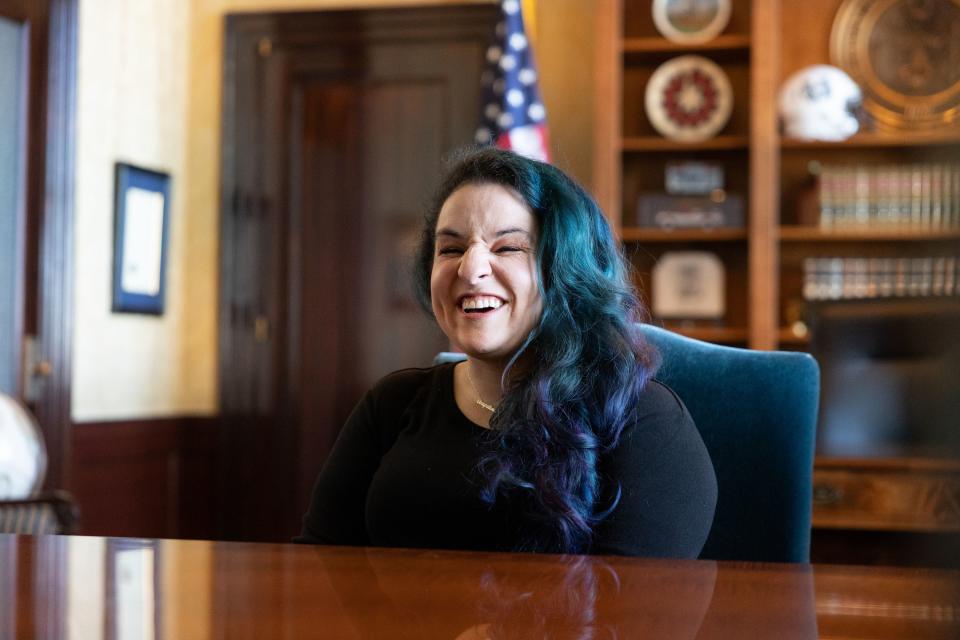Welcome to ‘Jewtah’! Population: 3
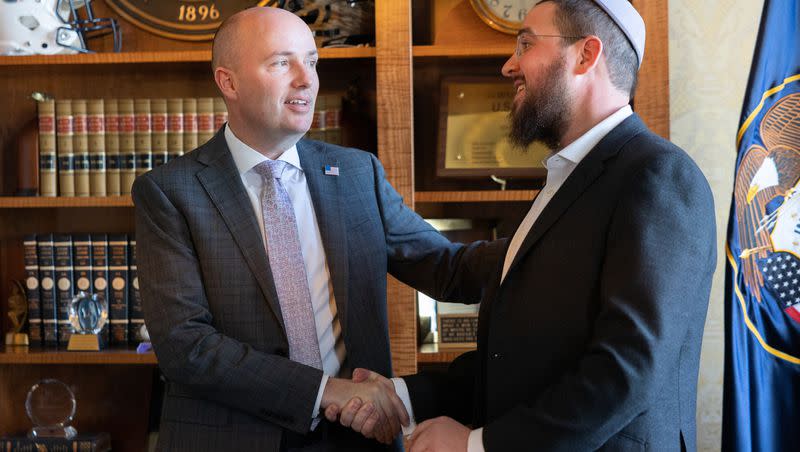
- Oops!Something went wrong.Please try again later.
It’s a Monday afternoon, and a rabbi, a Latter-day Saint governor and a Jewish policy wonk walk into a room. It sounds like the start of a bad joke, but this is no joke, nor is it coincidence — these three friends circled the meeting on their calendars weeks ago, under the enigmatic subject line “JEWTAH!”
Rabbi Avermi Zippel arrives first, sporting a trim, dark suit and a grey kippah, and takes a seat outside the governor’s office. Gov. Spencer Cox arrives soon after, trailed by a throng of aides, and greets the rabbi.
“Do we know where Shoshana is?” one staffer asks, and the rabbi pulls out his phone before noting he doesn’t have the third guest’s phone number. “We communicate through Twitter DMs,” he says, smiling.
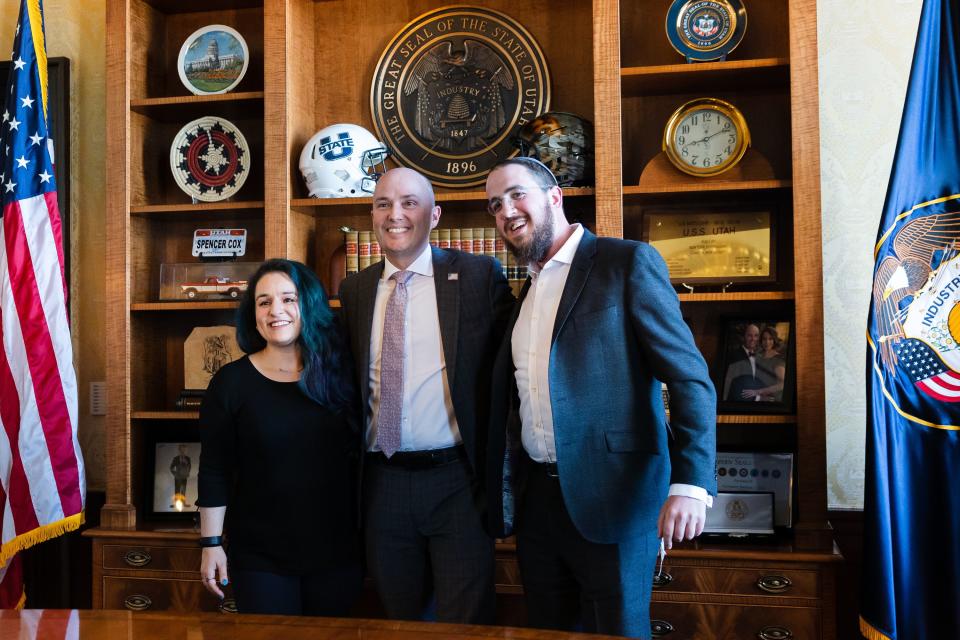
Before the third guest arrives, let’s meet the friends: There’s Rabbi Avrohom “Avremi” Zippel, the program director of Salt Chabad Lubavitch of Utah and the state’s first homegrown rabbi. (He moved to Salt Lake City from Brooklyn when he was 1 year old, when his father — Rabbi Benny Zippel — established Utah’s Chabad congregation.)
There’s Spencer Cox, Utah’s first-term governor, who has emerged as an ally to Utah’s small-but-growing Jewish community. He led a delegation to Israel in 2022, where he met with the country’s president, visited the Yad Vashem Holocaust memorial museum and prayed at the Western Wall, alongside the elder Rabbi Zippel.
And then there’s Shoshana Weissmann, the Jewish digital director at the R Street Institute, a Washington, D.C.-based libertarian think tank. She’s garnered something of a cult following on social media for her eclectic personality and her political spark — her purple-and-blue hair, and a stuffed animal she named “James Madisloth.”
Weissmann arrives in a rush, sporting a Fitbit and a hiking backpack — she’s on a three-day work trip to Utah, but the real reason she comes to the state is for the mountains. “How can you not fall in love with this?” she says, signaling out the window.
The three friends make for an interesting bunch. But their ecumenical relationship, in a state dominated by one Christian religion, hints at how one faith tradition can help another as antisemitic incidents surge in the U.S.
Somehow, calling them “friends” seems wholly natural, though only two of them have ever met in person. Weissmann first interacted with both through Twitter — the rabbi, because she was searching for a Jewish community in her adopted state, and the governor, because ”when Trump rose to power, he was one of the few sane Republicans,” Weissmann said.
Cox’s apparent love for Judaism doesn’t hurt, either. “I don’t think I’ve seen a governor post more pictures with rabbis,” Weissmann said. “It’s like you’re finding every rabbi here, saying, ‘let’s be friends.’”
Cox smiles, saying it happens organically. (There are, it turns out, only about 10 rabbis in the state.)
Weissmann first discovered Utah in 2018, and over the two subsequent years, she visited four times; on the fifth visit, she brought her parents, and Cox arranged for a private dinner with them at the Governor’s Mansion.
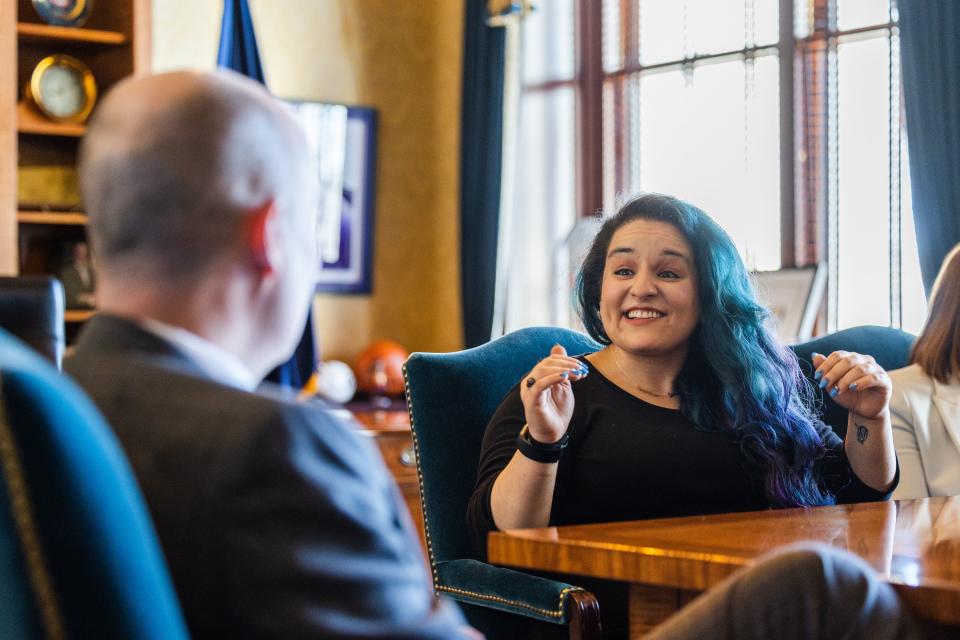
Cox’s relationship with Rabbi Zippel, however, goes back a bit further. Their first interaction was in 2014, when then-Gov. Gary Herbert arranged for the first-ever menorah lighting ceremony in the Utah Capitol. Minutes before the ceremony was to begin, Cox requested for additional reserved seats, which sent Rabbi Zippel scrambling. Rabbi Zippel later learned that the seats were for Cox’s children, who he wanted to witness the unique event.
“That’s been the hallmark of our relationship,” Rabbi Zippel recalls. “He has a deep respect for our faith, and he wanted those closest to him to feel the same.”
Related
Pleasantries through, the friends move on to the real agenda item. “So, why didn’t my flag design win?” Weissmann asks. When Utah lawmakers were accepting public submissions for a new state flag last year, she’d playfully tweeted her own design — featuring a Star of David, a beehive, a space laser and the word “JEWTAH” sprawled along the bottom.
“There was more support for other options,” the governor deadpans.
Long work day so I took a quick break to try a new Utah state flag design concept. @SpencerJCox just gonna start a thread so you can tell me your feedback or just know what horrors are happening in my photoshop. Also cc @UtahRabbi pic.twitter.com/dwnrsjzBb0
— Shoshana Weissmann, Sloth Committee Chair 🦥 (@senatorshoshana) January 20, 2022
The conversation drifts from flag designs, to weather, to fighting antisemitism. (Anything and everything is on the table; Weissmann’s Google Calendar invitation said they’d “chat about Judaism, Utah, policy, mountains, and anything else we like!”) Cox leads off by reminding his guests that Utah was the third state to have a Jewish governor, when Simon Bamberger was elected in 1917.
“How did he get here?” Rabbi Zippel asks, bewildered, before acknowledging Utah’s Jewish community consistently “punches above its weight.”
At present, there are an estimated 6,000 Jews in Utah, among a state population of 3.3 million. But Jews feel welcome here, Rabbi Zippel says.
“I can’t attempt to speak for the whole community,” Rabbi Zippel says. “But it’s a remarkable place to be, to start a family. There’s a certain commonality.”
That respect is mutual. When Cox asked Utahns in 2021 to pray for rain as “divine intervention” to combat the state’s ongoing draught, he was met by scorn from some, but the state’s Jewish community, he notes, was unequivocally supportive.
Related
Pray for rain: Utah Gov. Spencer Cox says ‘divine intervention’ is needed amid dire drought
Antisemitic incidents are surging in the U.S., according to a new report
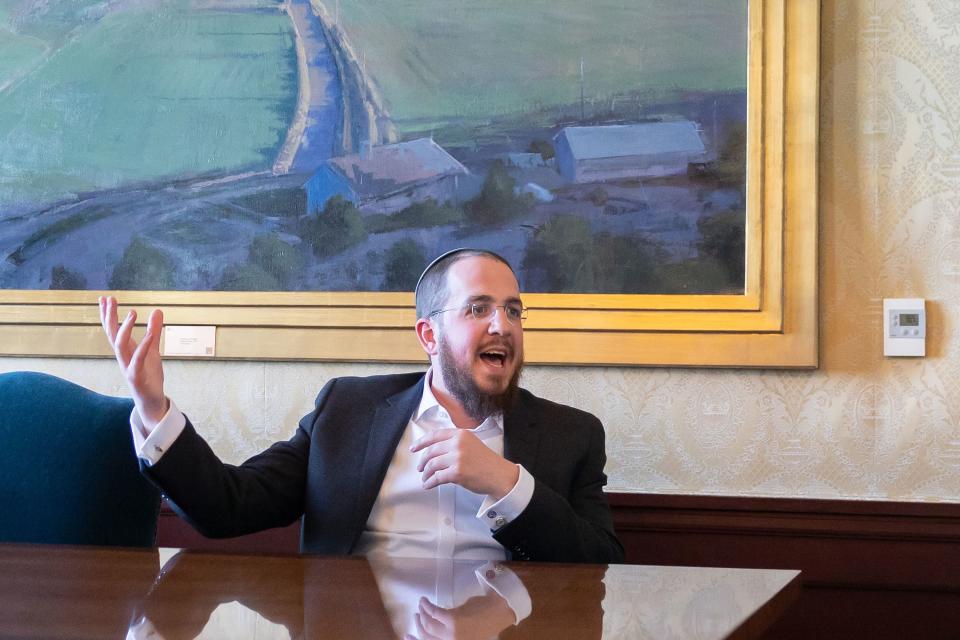
“They said, ‘we’re fasting and praying with you,’” Cox recalls. “That it felt like a real unifying thing for us.”
At this, Rabbi Zippel nods at the snow-capped mountains out the window and jokes, “I hear you guys are going floating in the Great Salt Lake this summer.”
Cox smiles. “Now we’re praying it comes down gently.”
Rabbi Zippel’s perspective on the relationship between Latter-day Saints and Jews in Utah is a unique one. When his family arrived in 1992, the state’s Jewish population was a fraction of what it is now. Rabbi Zippel views the relationship as one of brotherhood — both have experienced expulsion and the longing for a homeland, and both receive less-than-flattering portrayals in public, at times.
Rabbi Zippel quotes The Atlantic’s McKay Coppins, whose review of Hulu’s “Under the Banner of Heaven” notes, “If you learn about Mormonism from watching TV, you might think that we spend all of our time kidnapping and murdering or getting kidnapped and murdered.”
Rabbi Zippel feels the same about many portrayals of Jews. “All you know about us on Netflix is space lasers and dishonesty and Madoff,” he says. “There are a lot of good folks whose stories aren’t being told in the public arena.”
Cox presses him on this. “We’re having this wonderful conversation,” he interjects, “but sadly, we have not eliminated antisemitism from the state.” What is it really like living here as a Jew?
Rabbi Zippel explains that the state has certainly changed since his childhood. Growing up, it felt like living in a fishbowl: “People would see my dad with a kippah, and they’d think, ‘Where did you come from, and how long are you staying?’”
Rabbi Zippel chalked up many such comments and questions to genuine curiosity, and took no offense. (He recalls, for example, some friends at school asking if he had horns.) But today, Rabbi Zippel posits, negative views of Jews are no longer born of innocent curiosity, but of a lack of understanding.
“The curiosity has been swapped out with ignorance,” Rabbi Zippel says. “People are cool with very observant Jews walking the streets of Salt Lake City. But now the question is, what does that mean if they’re your neighbor?”
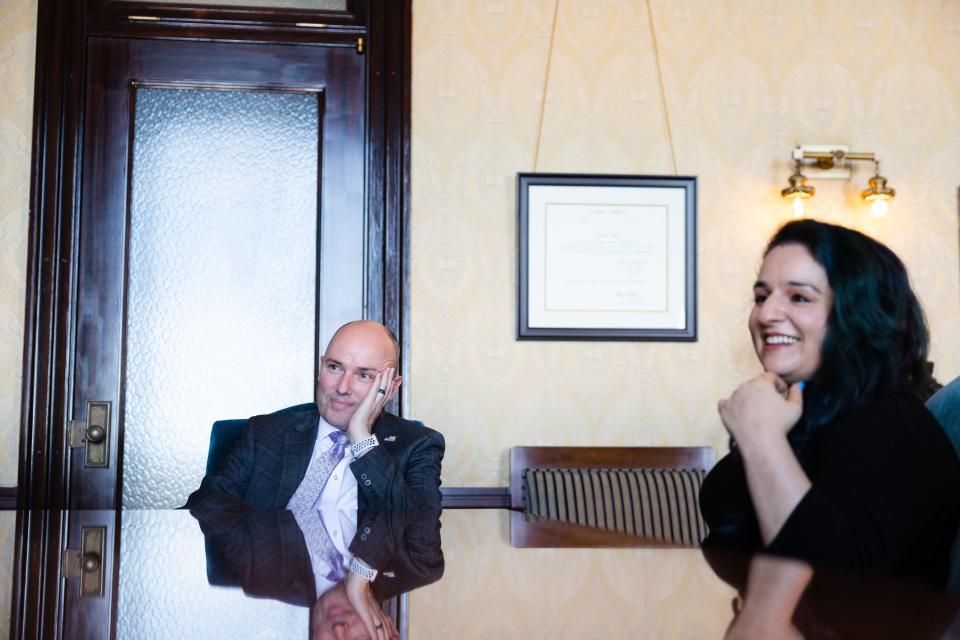
Even as Rabbi Zippel lauds the state’s embrace of its Jewish community, his experience has not always been Zion. Rabbi Zippel’s synagogue was defaced with a swastika in 2021. In 2022, a prominent Utah businessman was fired after sending an antisemitic email. In recent months, a string of antisemitic incidents have occurred at the University of Utah.
“I think both Jews and LDS people remember when we were persecuted,” Weissmann says. “And I worry sometimes when any group of people forget that. It’s so important to remember this, and make sure it doesn’t happen to other people, too.”
Cox nods. “If people don’t feel that belonging here,” he adds, “they won’t stay.”
As Cox excuses himself for another meeting, Weissmann and Rabbi Zippel stay to chat. They talk through their Passover celebrations and the difficulty, at times, of finding Kosher food in Utah. It requires Talmudic patience.
Weissmann grins, and mentions policy for the first time all day. “Look, I’m all for Kosher regulatory reform,” she jests.
